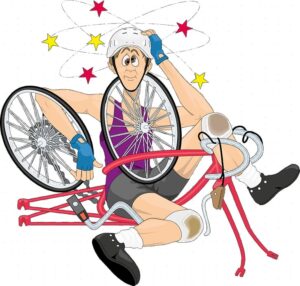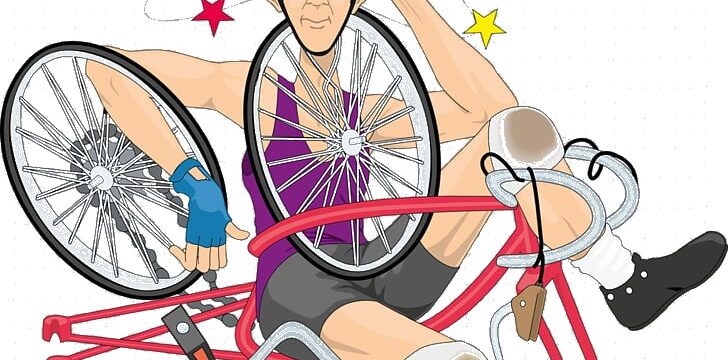How to deal with anxiety caused by a cycling accident

A recent close call with a car driver has made me reflect on how to cope with anxiety caused by a cycling accident. A couple of weeks ago I was riding home and had a very close call with a driver in the roundabout just near my home. Thankfully I was completely unharmed but very shaken. In fact, I couldn’t stop shaking and that’s because three years earlier I was actually hit by a car under very similar circumstances and the anxiety I felt came rushing back. And since that occurrence, I’ve been feeling a low level of anxiety every time I go out on my bike.
That got me thinking that I should look at some techniques to deal with anxiety caused by a cycling accident, and try out the techniques on myself.
After an actual cycling accident, we often focus on physical injuries because they are the most obvious but any successful recovery plan should also include the mental injury. My way of dealing with the accident three years ago was to get back to riding fairly quickly after the bruises healed. I was fairly nervous and jumpy at first but those feelings dissipated over time, and while I’ve never completely forgotten, until the recent incident I was coping really well.
As fear is an emotional response, experts advise that you need to understand what you’re fearful of, and to confront it. For me, that’s to ride through the roundabout to see that it is usually incident-free.
Those same experts also recommend that you talk about it. I’ve actually chatted with a few friends about it but don’t want to make a big deal out of my own fears because I don’t want to project my anxiety onto other people. Within my riding group I’m one of the leaders and I don’t want my experience to stop other women from riding.
Here’s some expert advice I found in an article on the now defunct Total Women’s Cycling.
Fight or Flight?
Everyone has the same two options available to them when recovering from an injury or fall, and that is to take flight of it all: avoid features, risk and even riding altogether, or you fight. Hop back on the bike and fight the fear. Here are some tips for getting the control back:
What are you afraid of, and why? Ask yourself this. Understand what your fear is, and why you feel this way. If it’s a particular feature you fell on, then study it. Watch other people do it. If it’s a particular junction on the road, try riding it with a confident friend and follow their movements. Dissect the fear into pieces so that it doesn’t feel as big and suffocating.
Positive mental attitude. Believe it or not, changing your outlook to a more positive one can make all the difference. You have to want to get back on the bike and beat your fear. You have to visualise yourself doing it and believe in yourself.
Listen to your body Learn some breathing techniques to relax your body, muscles and mind. If you feel yourself getting too anxious while riding, then take a breather to regain control of your body. Effective meditation links in with having a more positive outlook on your riding performance and will be the driving force behind recovery.
Baby steps. Take it easy, getting back to your old daredevil self will take time. Ease yourself back on the bike, pick up speed and attack some smaller features which you can build up from. Sometimes you need to go back to go forwards again, and there’s nothing wrong with this.


For me, riding a different route helped me not re-experience the trauma. After a while, when feeling better, I would take that route again. It also helped me to learn these types of reactions occur, unbeknownst to us due to social conditioning in everyday life and that there are resources for recognizing and working with them. I would recommend My Grandmother’s Hands by Resmaa Menakem.